2022年外研版中考英语二轮复习第七节 动词和动词短语课件(共106张PPT)
文档属性
| 名称 | 2022年外研版中考英语二轮复习第七节 动词和动词短语课件(共106张PPT) |  | |
| 格式 | pptx | ||
| 文件大小 | 901.5KB | ||
| 资源类型 | 教案 | ||
| 版本资源 | 外研版 | ||
| 科目 | 英语 | ||
| 更新时间 | 2022-05-24 22:50:01 | ||
图片预览

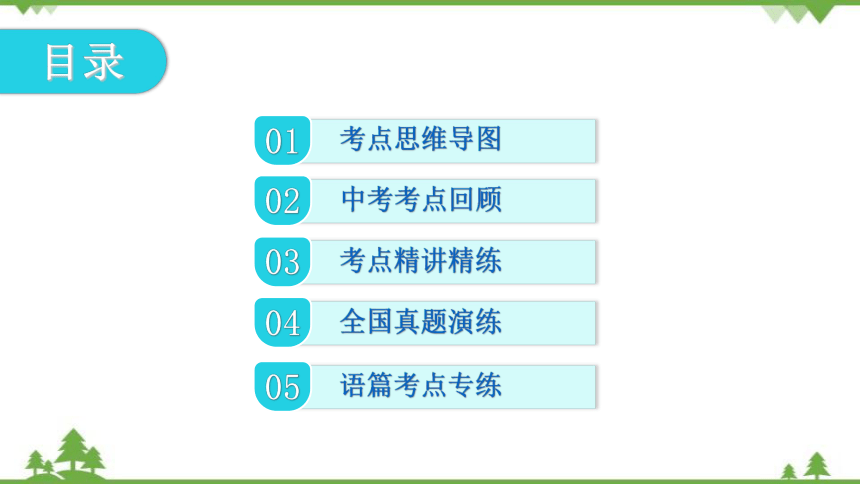
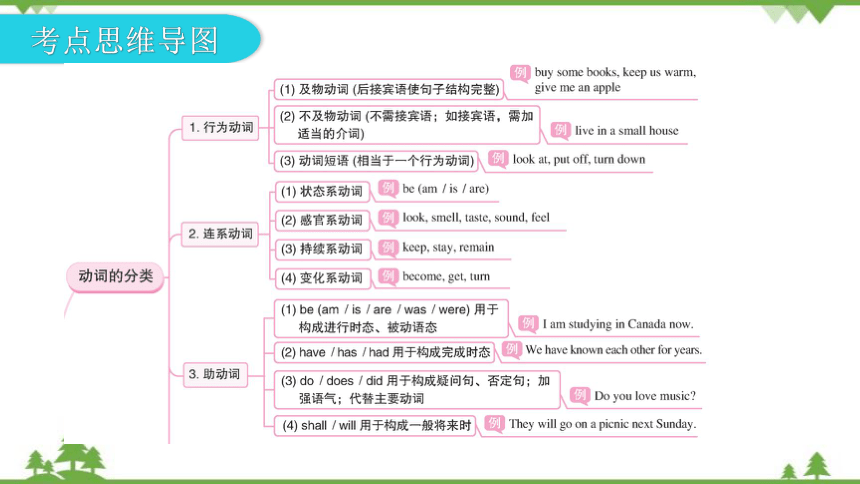
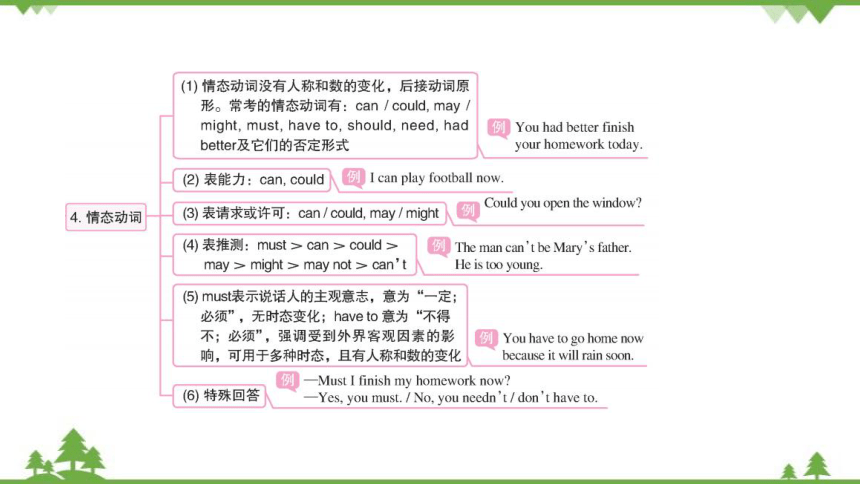
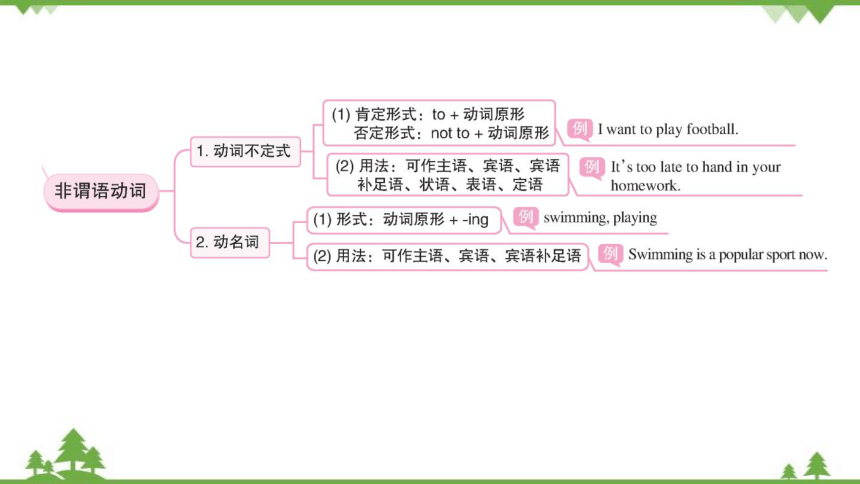
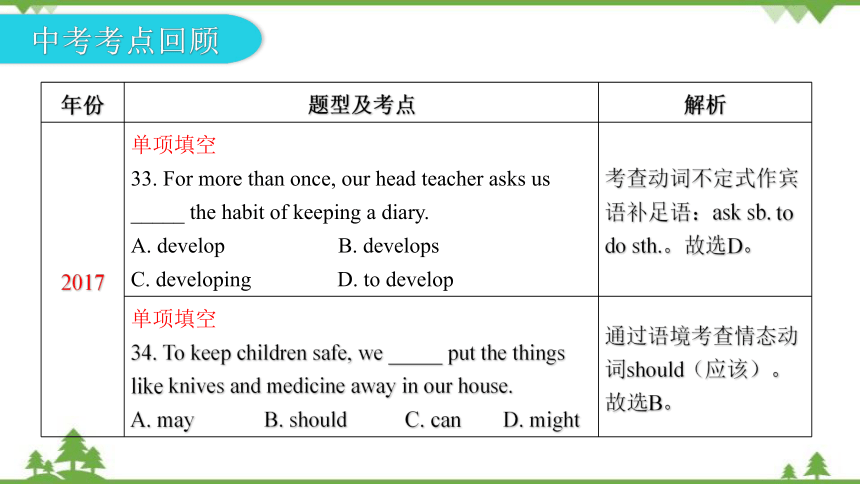
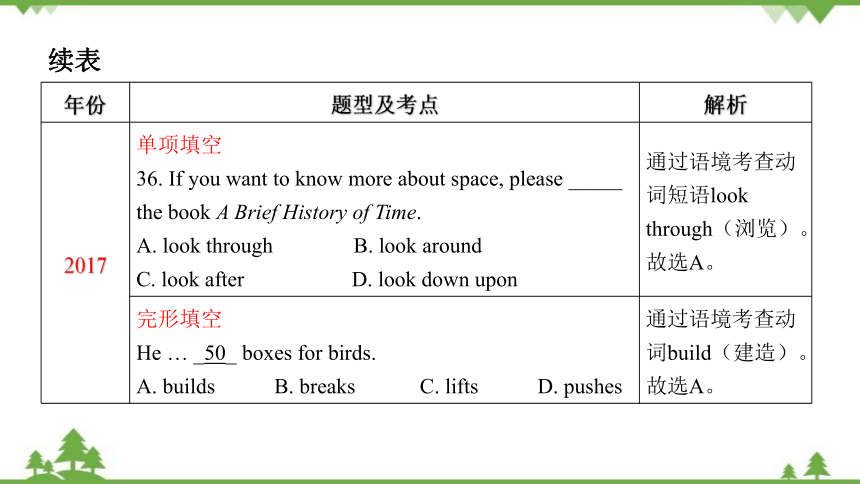
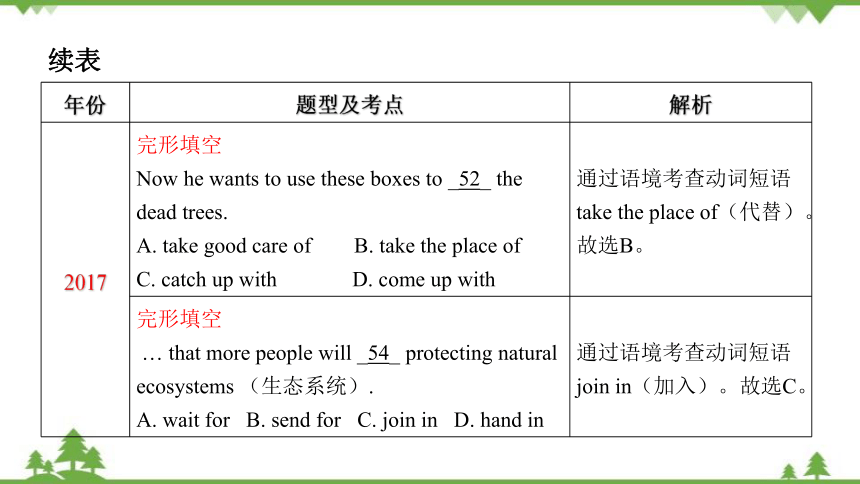
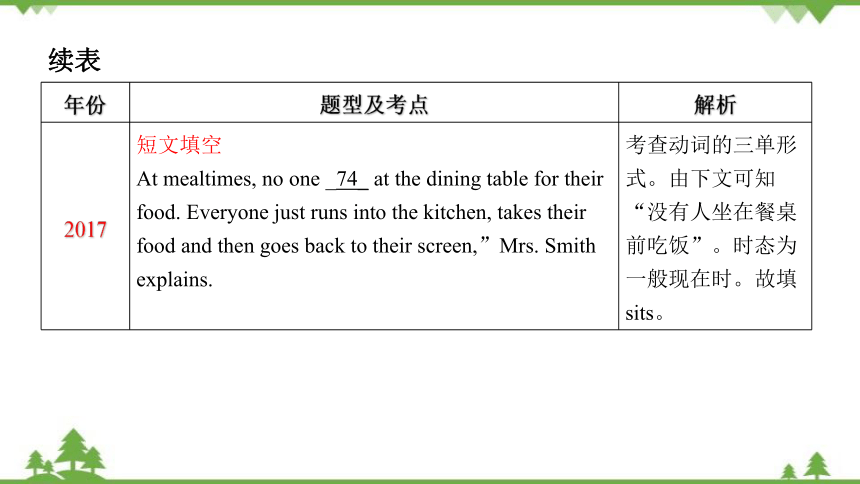
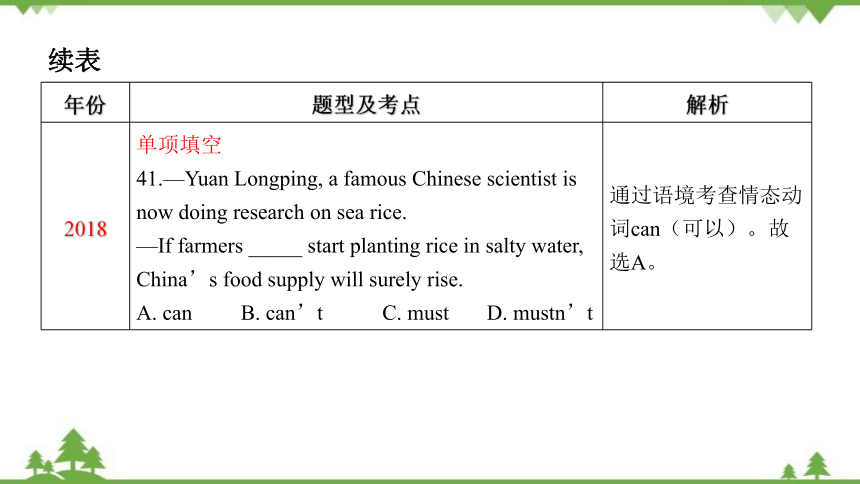
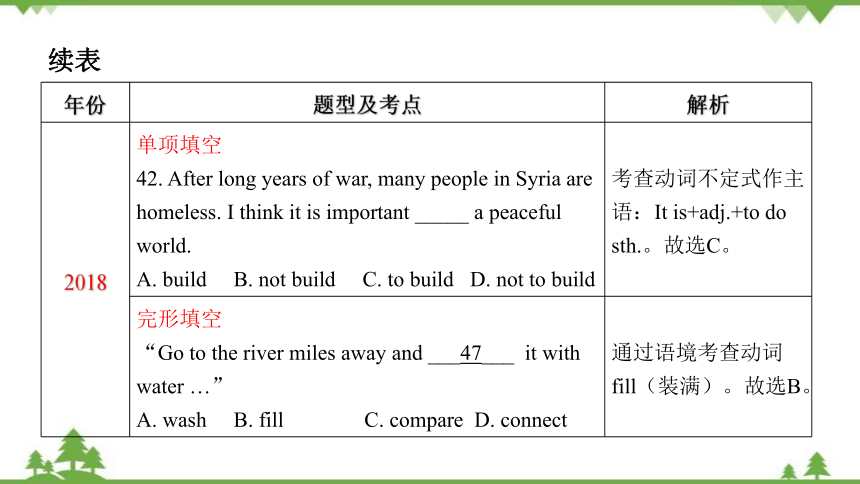
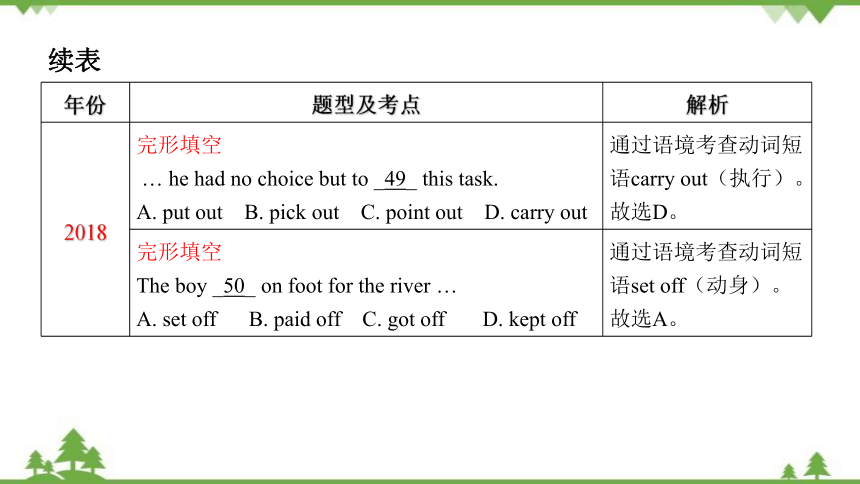
文档简介
(共106张PPT)
第一部分 基于语义的语法知识篇
第七节 动词和动词短语
目录
01
考点思维导图
02
中考考点回顾
03
考点精讲精练
04
全国真题演练
05
语篇考点专练
考点思维导图
中考考点回顾
年份 题型及考点 解析
2017 单项填空 33. For more than once, our head teacher asks us _____ the habit of keeping a diary. A. develop B. develops C. developing D. to develop 考查动词不定式作宾语补足语:ask sb. to do sth.。故选D。
单项填空 34. To keep children safe, we _____ put the things like knives and medicine away in our house. A. may B. should C. can D. might 通过语境考查情态动词should(应该)。故选B。
年份 题型及考点 解析
2017 单项填空 36. If you want to know more about space, please _____ the book A Brief History of Time. A. look through B. look around C. look after D. look down upon 通过语境考查动词短语look through(浏览)。故选A。
完形填空 He … _50_ boxes for birds. A. builds B. breaks C. lifts D. pushes
通过语境考查动词build(建造)。故选A。
续表
年份 题型及考点 解析
2017 完形填空 Now he wants to use these boxes to _52_ the dead trees. A. take good care of B. take the place of C. catch up with D. come up with 通过语境考查动词短语take the place of(代替)。故选B。
完形填空 … that more people will _54_ protecting natural ecosystems (生态系统). A. wait for B. send for C. join in D. hand in
通过语境考查动词短语join in(加入)。故选C。
续表
年份 题型及考点 解析
2017 短文填空 At mealtimes, no one _74_ at the dining table for their food. Everyone just runs into the kitchen, takes their food and then goes back to their screen,”Mrs. Smith explains. 考查动词的三单形式。由下文可知“没有人坐在餐桌前吃饭”。时态为一般现在时。故填sits。
续表
年份 题型及考点 解析
2018 单项填空 41.—Yuan Longping, a famous Chinese scientist is now doing research on sea rice. —If farmers _____ start planting rice in salty water, China’s food supply will surely rise. A. can B. can’t C. must D. mustn’t 通过语境考查情态动词can(可以)。故选A。
续表
年份 题型及考点 解析
2018 单项填空 42. After long years of war, many people in Syria are homeless. I think it is important _____ a peaceful world. A. build B. not build C. to build D. not to build 考查动词不定式作主语:It is+adj.+to do sth.。故选C。
完形填空 “Go to the river miles away and ___47___ it with water …” A. wash B. fill C. compare D. connect 通过语境考查动词fill(装满)。故选B。
续表
年份 题型及考点 解析
2018 完形填空 … he had no choice but to _49_ this task. A. put out B. pick out C. point out D. carry out 通过语境考查动词短语carry out(执行)。故选D。
完形填空 The boy _50_ on foot for the river … A. set off B. paid off C. got off D. kept off 通过语境考查动词短语set off(动身)。故选A。
续表
年份 题型及考点 解析
2018 完形填空 When he returned, the boy was able to _53_ everything he had seen to the old man. A. change B. imagine C. examine D. describe 通过语境考查动词describe(描述)。故选D。
短文填空 Once, Will and his brother Harry _73_ given a job to rebuild a broken brick(砖)wall in the yard. 考查助动词be构成被动语态。主语为复数,时态为一般过去时。故填were。
续表
年份 题型及考点 解析
2018 短文填空 Each time they were about to give up, their father _78_ them up patiently. 考查动词的搭配cheer up(使振作起来)或back up(支持)。时态为一般过去时。故填cheered / backed。
2019 单项填空 36. Young people are encouraged to work hard _____ their own dreams. A. achieve B. achieves C. to achieve D. achieved 考查动词不定式作目的状语。故选C。
续表
年份 题型及考点 解析
2019 单项填空 42. Dirty air and water are harmful. They _____ kill plants, and even people. A. can B. can’t C. should D. shouldn’t 通过语境考查情态动词can表能力。故选A。
完形填空 Some days they could spend hours happily together without any argument, but other days they just could not _46_ on what to do. A. agree B. live C. depend D. try 通过语境考查动词agree(同意)。故选A。
续表
年份 题型及考点 解析
2019 完形填空 She was getting a little unhappy and _48_, leaving Cindy alone. A. went over B. went on C. went by D. went away 通过语境考查动词短语go away(走开)。故选D。
完形填空 The next day at school, their teacher Mrs. Stone _50_ their notebooks. A. gave away B. asked for C. handed in D. paid for 通过语境考查动词短语ask for(要求)。故选B。
续表
年份 题型及考点 解析
2019 完形填空 Mrs. Stone helped them _55_ that it was a good idea to take turns to decide the activity. A. describe B. explain C. guess D. realize 通过语境考查动词realize(意识到)。故选D。
短文填空 I liked him so much that I asked a visitor to _77_ a photo of that painting and me. 考查动词的搭配take a photo(照相)。因前面接to,所以用动词原形构成不定式。故填take。
续表
年份 题型及考点 解析
2020 语法选择 I except each of you _33_ a kite that means something important to you. A. make B. to make C. making D. made 考查动词不定式作宾语补足语:expect sb. to do sth.。故选B。
完形填空 As years went by, Mr. Smith _41_ his look. A. was bored of B. was relaxed about C. was excited about D. was pleased with 通过语境考查动词短语be bored of(对……感到厌烦)。故选A。
续表
年份 题型及考点 解析
2020 完形填空 Several months ago, Mr. Smith went to a body engineering shop and _42_ a small nose. A. cared for B. waited for C. asked for D. sent for 通过语境考查动词短语ask for(要求)。故选C。
完形填空 He was _49_ to enter places like railway stations and airports. A. guided B. refused C. forced D. allowed 通过语境考查动词refuse(拒绝)。故选B。
续表
年份 题型及考点 解析
2020 短文填空 She felt sad that the kids there didn’t have new clothes to _68_ and toys to play with. 考查动词的搭配wear clothes(穿衣服)。因前面接to,所以用动词原形构成不定式。故填wear。
短文填空 With the help of her mother, Jane _72_ up her first lemonade stand(摊档). In a week, it made $52. 考查动词的搭配set up / put up(建立)。时态为一般过去时。故填set / put。
续表
年份 题型及考点 解析
2021 语法选择 Many tourists, they believe, will come _38_ the fantastic experience of walking across. A. enjoy B. enjoyed C. enjoying D. to enjoy 考查动词不定式作目的状语。故选D。
完形填空 Last month, a space agency(机构) told the public that they were _41_ “a planet protection officer.” A. waking up B. looking for C. dealing with D. talking about 通过语境考查动词短语look for(寻找)。故选B。
续表
年份 题型及考点 解析
2021 完形填空 This job is to _47_ the earth from germs (细菌) on things brought back from other planets. A. move B. protect C. pull D. collect 通过语境考查动词protect(保护)。故选B。
完形填空 Bill ended the letter with some warm words, _48_ Sam to study hard and do well in school. A. warning B. helping C. ordering D. encouraging 通过语境考查动词encourage(鼓励)。故选D。
续表
年份 题型及考点 解析
2021 完形填空 “We hope to _49_ you at the agency one day,” he wrote. A. see B. tell C. thank D. search 通过语境考查动词see(看到)。故选A。
短文填空 His Chinese friends _68_ him “Lao Pan”. 考查动词原形。由后面的“Lao Pan”可知此处是“称呼”。时态为一般现在时。故填call。
续表
年份 题型及考点 解析
2021 短文填空 In 1988, Lao Pan first came to China and _69_ as a teacher at a university. 考查动词的搭配“work as+职业”(做……工作)。时态为一般过去时。故填worked。
短文填空 Since then he has _71_ thirteen books about China. 考查动词的搭配write books(写书)或publish books(出版书)。因时态为现在完成时,所以应填动词的过去分词。故填written / published。
续表
考点精讲精练
考点1
行为动词
1.行为动词
行为动词是能单独作谓语的动词,其词义需要根据上下文的语境来判断。按其句法作用可分为不及物动词和及物动词。具体用法如下:
类别 要点 举例
(1) 及物动词(后接宾语才能使句子结构完整) ①动词+宾语 I bought some books yesterday. 我昨天买了一些书。
②动词+宾语+宾补 The sun keeps us warm. 阳光让我们温暖。
③动词+双宾语 (即直接宾语和间接宾语) My mother gave me an apple. 妈妈给了我一个苹果。
续表
类别 要点 举例
(2) 不及物动词 ①本身有完整的意思,后不需接宾语 He is a good student because he always studies hard. 他是一个好学生,因为他一直努力学习。
②若不及物动词需要接宾语,需加适当的介词,才可以接宾语 They live in a small house in Beijing. 他们住在北京的一所小房子里。
(3)有的动词既可作及物动词,又可作不及物动词 She sings very well. 她唱得很好。(sing作不及物动词)
She sang an English song just now. 她刚才唱了一首英文歌。(sing作及物动词)
2.动词短语
(1)动词短语在意义上相当于一个行为动词,是由两个或两个以上的单词构成的短语。常见的动词短语有以下几种形式:
动词+介词 look at 看 worry about 担心
动词+副词 put off 推迟 pick up 捡起
动词+名词+介词 make friends with 和……交朋友 pay attention to 注意
动词+副词+介词 stay away from 远离 get along with 进展;相处
动词+介词+名词 go to school 去上学 go to bed 上床睡觉
【注意】 在“动词+副词”短语中,名词可放在短语的中间或后面,但代词一定要放在短语的中间。
例 He turned off all the lights when he left. = He turned all the lights off when he left. 当他离开时,他关上了所有的灯。
He picked it up and gave it to me. 他捡起它,然后把它交给了我。
(2)同一个动词与不同介词或副词的搭配、不同动词与同一个介词或副词的搭配会产生不同意义的动词短语。常考的动词短语归纳如下:
①同一动词+不同介词/副词
get 短语 get up 起床 get on 上车 get off 下车 get to 到达
get over 克服 get down 记下 get together 相聚
get on/along with 与……友好相处
get ready for 为……做准备
续表
look短语 look at 看 look for 寻找 look like 看起来像 look out 当心
look up 查阅 look after 照顾 look over 检查
look through 浏览 look out of 向……外看
look forward to 盼望;期盼
look down on/upon 瞧不起;轻视
put短语 put on 穿上;上演 put away 收好;放好
put down写下;记下 put off 推迟
put out 熄灭 put up 张贴;搭建
续表
turn短语 turn on 打开 turn off 关掉 turn up 调大;调高
turn down 调小;调低 turn into变成
turn out 发生;结果是
take 短语 take up 占据;开始做 take off 脱掉;起飞 take out 拿出 take down 写下;拿下 take place 发生
take over 接收;接管 take after 长得像 take a risk 冒险
take part in 参加 take care of 照顾;照料
续表
come短语 come from 来自 come in 进来 come over 来访
come out 出来;出版 come true 实现 come down 落下 come across 偶然遇见 come up with 想出;提出
give短语 give away 捐赠 give back 归还 give out 分发 give up 放弃
give off 发出(光、热)
go短语 go by (时间) 流逝 go off 爆炸;响起 go on 继续
go over 仔细检查
续表
cut短语 cut down 砍倒;削减 cut in 插嘴
cut off 中断 cut out 删去 cut up 切碎
think短语 think about 考虑 think of 想起;记起
think over仔细考虑 think up 想出
②不同动词+同一介词/副词
for类 care for关心 look for寻找 wait for等待 stand for代表
pay for为……付款 ask for请求;要求
thanks for 因……而感谢
down 类 cut down 砍倒;削减 calm down 镇静 lie down 躺下
sit down 坐下 shut down 关闭;停下
bring down 降低;击落 knock down 拆除;摧毁
break down 发生故障
put down = take down = write down 写下;记下 cool down 冷静
续表
up类 call up 打电话 fix up 修理 grow up 长大 give up 放弃
set up 成立 tidy up 收拾 put up 张贴;搭建
pick up 捡起 stay up 熬夜 show up 出现;露面
take up 占据;开始做 eat up 吃光 use up 用光
clean up 打扫 hang up 挂起来
out 类 find out 找出;查明 come out 出来;出版
look out 当心 take out 拿出 speak out 说出 blow out 吹灭
start out = set out 启程 stand out 杰出;出色 sell out 卖光
break out 爆发 turn out 发生;结果是 carry out 实施;执行 hand out = give out 分发
续表
at 类 look at 看 knock at 敲 laugh at 嘲笑
smile at 朝……微笑
about类 care about 关心 talk about 谈论 worry about 担心
think about 考虑
in 类 believe in 信任 bring in 引进 hand in 上交
take in 吸入;吞入 take part in 参加
join in 参加;加入 succeed in 成功(做某事)
take pride in 以……为骄傲
续表
on类 agree on 达成一致 depend on 依靠 focus on 集中于
hold on 坚持;稍等 live on 以……为生
turn on 打开 put on 穿上;上演 get on 上车
try on 试穿 move on 往前走
keep one’s eye on 留神;注意 pass on 传递 keep on 继续
off 类 get off 下车 take off 脱掉;起飞 break off 突然中断
go off 爆炸;响起 put off 推迟 show off 炫耀
die off 相继死去
续表
after 类 look after 照顾 run after 追逐 take after 长得像
away类 run away 逃跑 put away 收好;放好 take away带走
throw away 扔掉 give away 捐赠
with 类 agree with 同意 deal with 处理 fill with 装满
come up with 想出;提出 catch up with 追赶上
keep / stay in touch with 与……保持联系
get on/along with 与……友好相处
connect with 与……友好相处 play with 和……一起玩
( )1. —Who ____ the computer?
—Sorry, I have no idea. But it has changed the world greatly.
A. invented B. discovered C. made D. found
( )2. —Wow,your sweater is very beautiful!How much is it?
—Thank you. It ____ me 30 dollars.
A. spent B. paid C. cost D. took
A
C
( )3. —I can’t find my mobile phone.
—Don’t worry. Maybe you ____ it at home.
A. forgot B. missed C. lost D. left
( )4. —The jeans are very nice. I’ll take them.
—You’d better ____ first. I’m afraid the size is a bit small for you.
A. pay for them B. take them off
C. try them on D. pick them up
D
C
( )5. —How is our government going to deal with the office building?
—It will be ____ a library.
A. turned off B. turned on C. turned out D. turned into
D
考点2
连系动词
连系动词有一定词义,但不完整,不能单独作谓语。它必须与表语一起构成系表结构,说明主语的状态、性质、特征等。常见用法如下:
类别 要点 举例
1. 状态系动词 be (am/is/are) 是 She is honest and kind. 她诚实又善良。
2. 感官系动词 look 看起来 smell 闻起来 taste 尝起来 sound 听起来 feel 感觉起来 The cake tastes delicious. 这个蛋糕尝起来很美味。
The park looks very beautiful. 这个公园看起来很漂亮。
3. 持续系动词 keep 保持 stay 保持 remain 保持 Stay there and don’t move! 待在那儿别动!
She always keeps silent whenever I see her. 不管我什么时候看见她,她总保持沉默。
类别 要点 举例
4. 变化系动词 become 变成 get 变得(+好坏/长短/冷热……) turn 变得(+颜色) It’s getting hotter and hotter. 天气越来越热。
His face turned red. 他的脸变红了。
续表
( )1. —It’s reported that self-driving cars are expected to change the way we move around.
—That sounds _____. I can’t wait to see that.
A. bad B. badly C. great D. greatly
( )2. —Alice, don’t eat too much junk food! They are bad for your health.
—OK, Mom. But it _____ really good.
A. feels B. looks C. tastes D. sounds
C
C
( )3. The police asked her what she was doing at 8:00 last night, but she _____ silent.
A. looked B. sounded C. got D. kept
( )4. When autumn comes, the leaves will _____ yellow.
A. get B. turn C. become D. grow
( )5. —3D printing could be used to build a house in less than 24 hours.
—It _____ amazing. It’s my first time to get to know this.
A. sounds B. smells C. tastes D. looks
D
B
A
助动词本身无词义或意义不完整,不能单独作谓语。它只能帮助实义动词完成某些语法功能,如表示时态、语态,构成否定句、疑问句、简略答语等。助动词主要有be,do,have,shall,will等。具体用法如下:
考点3
助动词
类别 要点 举例
1. be(am/is/are/ was/were) (1)构成进行时态 I am studying in Canada now. 我现在正在加拿大学习。
(2)构成被动语态 The glass was broken by Annie. 玻璃是被安妮打碎的。
2. have/has/had 构成完成时态 We have known each other for years. 我们相互认识多年了。
续表
类别 要点 举例
3. do/does/ did (1)构成疑问句、否定句 Do you love music?你喜欢音乐吗?
I didn’t know you were coming. 我不知道你要来。
(2)加强语气 She does love pop music. 她的确喜欢流行音乐。
(3)代替主要动词 She dances as well as I do. 她跳舞和我跳得一样好。
续表
类别 要点 举例
4. shall/will (shall用于第一人称,will用于各种人称) 构成一般将来时 Shall we go to the park tomorrow?我们明天去公园好吗?
They will go on a picnic next Sunday. 他们下星期天去野餐。
( )1. —What is your mother doing, Linda
—She _____ dinner in the kitchen now.
A. is cooking B. was cooking C. cook D. cooks
( )2. The documentary Aerial China (《航拍中国》)is wonderful. So far, I _____ it three times.
A. watched B. will watch C. have watched D. watch
A
C
( )3. —Your father has gone to Shenzhen on business,hasn’t he?
—Yes. And he _____ in two weeks.
A. will return B. has returned C. returned D. returns
( )4. —The passenger refused to move after taking someone’s seat.
—What a shame! He _____ according to the newly formed credit system(信用体系).
A. punish B. punished C. will punish D. will be punished
A
D
( )5. A lot of teenagers think as they are getting older and wiser, they _____ to make their own decisions.
A. should allow B. shouldn’t allow
C. should be allowed D. shouldn’t be allowed
C
情态动词有一定的词义,但不能单独作谓语。它没有人称和数的变化,后接动词原形。情态动词表示说话人的情绪、态度和语气。同时,它也能表明句子的否定、疑问或时态上的区别。
考点4
情态动词
1. 常考的情态动词一览表
情态动词 意义及用法
can / could ①能够(表能力)
②可以(表许可)
③可能(表推测,通常用于疑问句中)
may / might ①可以(表许可)
②或许(表推测)
情态动词 意义及用法
can’t / couldn’t ①不能(表能力)
②不可以(表许可)
③不可能(表推测)
may not / mightn’t ①不可以(表许可)
②或许不(表推测)
续表
情态动词 意义及用法
must 一定;必须(表主观推测,只用在肯定句中)
have to 不得不(表客观)
should 应该
情态动词 意义及用法
mustn’t 一定不能;不准(表禁止)
don’t have to 不需要(有人称、时态变化)
shouldn’t 不应该
续表
情态动词 意义及用法
need 需要
had better 最好
情态动词 意义及用法
needn’t 不必;不需要
had better not 最好不
2. 表能力: can, could
could为can的过去式。
【注意】can与be able to的意义基本相同,但be able to能用于各种时态。
例 I can drive a car. = I’m able to drive a car. 我会开车。
3. 表请求或许可: can / could, may / might
在口语中,常用could代替can,表示比较委婉、客气地向对方提出请求或表示看法, 此时could不表示过去式。 may/might, can/could表示许可时可互换,只是might, could的语气比较委婉。
例 Could you please tell me what happened last night?你能告诉我昨晚发生了什么事情吗?
4. 表推测:must>can>could>may>might>may not>can’t
must表示很有把握的推测,只用于肯定句,意为“肯定;必定”。could, may, might表示把握不大的推测,用于肯定句,意为“可能;也许”。can也可表示推测,通常用于疑问句中。may not表示“可能不”,can’t表示“不可能”,用于否定句。
例 He may like coffee. I see him drink some at times. 他可能喜欢咖啡。我看见他有时会喝一些。
5. must 与have to的区别
must表示说话人的主观意志,意为“一定;必须”, 无时态变化。have to意为“不得不;必须”,强调受到外界客观因素的影响。它可用于多种时态,且有人称和数的变化。
例 All the students must know that cheating in the exam is not allowed. 所有的学生必须知道考试中作弊是不被允许的。
We have to share the books because there aren’t enough for everyone. 我们不得不共用这些书,因为(这些书)不够每个人一本。
6. 特殊回答(情态动词表请求或许可)
—Can/Could I … —Yes, you can.
—No, you can’t.
—Must/Need I … —Yes, you must.
—No, you needn’t/don’t have to.
—May I … —Yes, please./Sure./Certainly./Of course.
—No/Sorry, you can’t./You’d better not.
( )1. David, _____you please sweep the floor and take out the trash
A. could B. may C. might D. must
( )2. —I won the first prize in the speech competition.
—Congratulations! You _____ be excited about it.
A. can B. must C. had to D. need
A
B
( )3. —_____I return the books this week
—No, you _____. You can do that next week.
A. Must; can’t B. May; needn’t
C. Need; mustn’t D. Must; needn’t
( )4. —The beautiful lady with glasses over there looks like our English teacher.
—It _____ be her. She has gone abroad.
A. can’t B. may not C. mustn’t D. needn’t
D
A
( )5. —_____ you leave now You just arrived here an hour ago.
—Sorry, but so much homework is waiting for me.
A. May B. Must C. Can D. Might
B
非谓语动词是指在句子中不能用作谓语的动词。非谓语动词分为三种形式:动词不定式、动名词、分词(包括现在分词和过去分词)。非谓语动词不受人称和数的限制,除了不能单独作谓语外,可以承担句子的其他成分。
考点5
非谓语动词
1.动词不定式
(1)形式:
①肯定形式:to+动词原形。
②否定形式:not to+动词原形。
例 The teacher told me not to be late tomorrow. 老师告诉我明天不要迟到。
(2) 用法:
用法 举例
作主语 作主语的动词不定式常用形式主语it代替,动词不定式后置,构成固定句型“It’s+adj.(+for / of sb.)+to do sth.” To protect our environment is very important. = It is very important to protect our environment. 保护好我们的环境是非常重要的。
It’s hard for me to learn English well. 学好英语对我来说是困难的。
续表
用法 举例
作宾语 ●作动词的宾语 ●作形容词的宾语 ●不定式和疑问词连用,作宾语(where to, when to, what to, how to, which to …) Jim wants to give me some money. 吉姆想给我一些钱。
I am afraid to stay at home alone. 我害怕独自待在家里。
Mary didn’t know where to go and what to do. 玛丽不知道该去哪里和该做什么。
续表
用法 举例
作宾语 补足语 不定式作宾语补足语与宾语逻辑上有主谓关系。后常接动词不定式作宾语补足语的谓语动词有:tell, ask, want, allow, get, would like, encourage等 【注意】还有一些使役动词和感官动词后也接不定式作宾语补足语,但不定式要省略to。这些动词有:hear, let, make, have, see, watch, notice等。但这些动词变为被动语态时,须加to He told me not to bring you anything. 他告诉我不要给你带任何东西。
I saw the man go into the shop. 我看见这个男人进了这家店。
The man was seen to go into the shop. 这男人被看见进了这家店。
续表
用法 举例
作状语 表示目的,可放句末也可放句首,放句首要用逗号分隔开 He went there to see his grandpa. = To see his grandpa, he went there. 他去那里是为了探望他的爷爷。
作表语 常放在系动词之后,表示具体的动作或将来的动作 My joy is to teach English. 我的工作是教英语。
作定语 常放在被修饰的名词或代词之后,作后置定语 I have a lot of homework to do. 我有许多作业要做。
【附1】常接动词不定式作宾语的动词
want to do sth. 想要做某事 pretend to do sth. 假装做某事 plan to do sth. 计划做某事
like to do sth. 喜欢做某事 refuse to do sth. 拒绝做某事 begin / start to do sth. 开始做某事
try to do sth. 设法做某事 expect to do sth. 期望做某事 would like to do sth. 想做某事
decide to do sth. 决定做某事 offer to do sth. 主动提出做某事 learn to do sth. 学习做某事
hope to do sth. 希望做某事 afford to do sth. 承担得起做某事 help to do sth. 帮忙做某事
agree to do sth. 同意做某事 continue to do sth. 继续做某事 promise to do sth. 承诺做某事
【附2】常接动词不定式作宾语补足语的动词
ask sb.(not) to do sth. 叫某人(不要) 做某事 wish sb.(not) to do sth. 希望某人(不要) 做某事
tell sb.(not) to do sth. 告诉某人(不要) 做某事 would like sb.(not) to do sth. 想要某人(不要) 做某事
want sb.(not) to do sth. 希望某人(不要) 做某事 encourage sb.(not) to do sth. 鼓励某人(不要) 做某事
teach sb.(not) to do sth. 教某人(不要) 做某事 allow sb.to do sth. 允许某人做某事
续表
expect sb.(not) to do sth. 盼望某人(不要) 做某事 invite sb.to do sth. 邀请某人做某事
advise sb.(not) to do sth. 建议某人(不要) 做某事 help sb.to do sth. 帮助某人做某事(施助者自己做)
help sb.do sth. 帮助某人做某事(两个人一起做)
【拓展】常见的不带to的动词不定式句型
句型 举例
①Why not do sth. = Why don’t sb. do sth. 为什么不做某事? Why not go out to see a film with me?= Why don’t you go out to see a film with me?为什么不和我一起出去看电影呢?
②would do … rather than do …(=would rather do … than do … =prefer to do … rather than do …=prefer doing … to doing …) 宁愿做……而不愿做…… I would stay at home rather than go out to play.我宁愿待在家里也不愿出去玩。
He prefers to have class rather than have a rest.他宁愿上课也不愿休息。
③would rather (not)do 宁愿(不)做 I would rather not play with him. 我宁愿不和他玩。
2.动名词
(1) 形式:动词原形+-ing。
(2) 用法:
用法 举例
作主语 谓语动词用单数形式 Finding a good job is difficult these days. 现在找一份好工作不容易。
作宾语 “动词/介词+v.-ing”构成动宾或介宾结构 Most students enjoy asking questions in English. 大部分学生都喜欢用英语提问。
作宾语补足语 We call the activity hiking. 我们把这种活动叫作徒步旅行。
【附1】后接动词-ing形式的单词、短语和句型
单词 avoid doing sth. 避免做某事 mind doing sth. 介意做某事 finish doing sth. 完成做某事
allow doing sth. 允许做某事 practice doing sth. 练习做某事 keep doing sth. 坚持做某事
enjoy doing sth. 乐意做某事 consider doing sth. 考虑做某事 介词+doing sth. ……做某事
续表
短语 make a contribution to doing sth. 为做某事而做贡献 feel like doing sth. 想做某事
pay attention to doing sth. 注意做某事 be busy doing sth. 忙于做某事
be / get used to doing sth. 习惯于做某事 be worth doing sth. 值得做某事
look forward to doing sth. 盼望做某事 have fun doing sth. 做某事有乐趣
have trouble doing sth. 做某事有困难 do some shopping 买东西
续表
短语 can’t help doing sth. 禁不住做某事 stop sb.from doing sth. 阻止某人做某事
spend+时间+(in) doing sth. 花时间做某事 prefer doing sth. to doing sth. 比起做某事,更喜欢做某事
句型 What / How about doing sth. 做某事怎么样
【附2】 常见的易混淆词组
forget doing sth. 忘记做过某事(已做) forget to do sth. 忘了要去做某事(未做) stop doing sth. 停止做某事
stop to do sth. 停止或中断做某事后去做另一件事
remember doing sth. 记得做过某事(已做) remember to do sth. 记得去做某事(未做) regret doing sth. 对做过的事感到遗憾、后悔(已做)
regret to do sth. 对要做的事感到遗憾(未做)
try doing sth. 试验/试着做某事 try to do sth.努力/企图做某事 go on doing sth. 继续做原来做的事
go on to do sth. 做了一件事后,接着做另一件事
( )1. —Mario,your mobile phone is ringing.
—Wait a minute. It’s dangerous for us ____ it while crossing the street.
A. answering B. to answer C. answer D. answered
( )2. —How do you feel when you see the national flag of China?
—It makes us ____ proud.
A. feel B. to feel C. felt D. feeling
B
A
( )3. The earth is in great danger now. We have to do something _____ it.
A. protect B. protecting
C. to protect D. protected
( )4. —Mr.Wang,I have trouble _____ the text.
—Remember _____ it three times at least.
A. to understand; reading B. understanding; reading
C. understanding; to read D. to understand; to read
C
C
D
( )5. For more than once, our head teacher asks us _____ the habit of keeping a diary.
A. develop B. develops C. developing D. to develop
编者按 更多动词辨析及短语归纳可见于《中考高频词汇突破》,并建议结合《早读本》进行记忆
全国真题演练
( )1. The official newspaper _____ the news of Tiangong-1,for it took a big step forward into space.(2021 武汉)
A. heard B. checked C. believed D. celebrated
( )2. —Sam, _____ I join you in the community service
—Of course you can. (2021 北京)
A. can B. must C. should D. need
D
A
( )3. —I saw Mr. Li in his office just now.
—No, it _____ be him. He has _____ Guangzhou and will be back in two days.(2021 新疆)
A. mustn’t; gone to B. mustn’t; been to
C. can’t; been to D. can’t; gone to
( )4. The trip _____ really exciting to me. How I wish to go! (2021 河北)
A. sounds B. smells C. tastes D. feels
D
A
( )5. —Hi, Carl! I’m leaving for Chengdu this weekend.
—Cool! But I _____ get away until the end of July. (2021 包头)
A. shouldn’t B. can’t C. needn’t D. mustn’t
( )6. —The computer is working again!
—It _____ yesterday, but someone has fixed it. (2021 包头)
A. broke down B. broke out
C. broke into D. broke away
B
A
( )7. Last September, Thunderstorm was shown _____ Cao Yu,one of China’s greatest playwrights.(2021 盐城)
A. remember B. remembering
C. remembered D. to remember
( )8. In many countries, people put their fingers up to their mouths _____ silence.(2021 扬州)
A. ask for B. asking for C. to ask for D. asked for
D
C
( )9. The government plans to _____ more jobs for young people in Western China.(2021 天津)
A. create B. avoid C. borrow D. guess
( )10. —Ms. Griffin, what should we do _____ stupid mistakes in the coming exams?
—Be more careful.(2021 达州)
A. avoid make B. avoiding making
C. avoid making D. to avoid making
A
D
一、语法选择
Do you know food deliverymen(外卖员) On almost every street in many Chinese cities, we can _1_ them in yellow or blue suits ride e-bikes. They rush from restaurants to businesses and homes. They _2_ our life more convenient than before.
语篇考点专练
see
make
A deliveryman _3_ pick up the order from the restaurant and deliver it to the customer in usually half an hour. In fact, the time limit (时限) for deliverymen _4_ normally shorter. The deliverymen face a physical and mental pressure because of the time limit set by food delivery apps. If they deliver an order late, even by one second, they will be fined (罚款).
has to
is
The time limit _5_ the risk of traffic accidents in recent years. In order to _6_ time, deliverymen often break traffic rules, putting not only their own lives at risk, but the lives of others as well. How dangerous it is!
Many customers in companies or schools often ask deliverymen _7_ for them to pick up their food at the gates. However, most of them _8_ show up in time, so the deliverymen
has increased
save
to wait
can’t
have to be responsible for the delays (延迟). It’s unfair for them. If customers can _9_ “I would like to wait longer.” in the app, deliverymen will be given more time. It will _10_ keep deliverymen safe on the roads. Please be patient.
choose
help
( )1. A. sees B. see C. seeing D. to see
( )2. A. making B. made C. makes D. make
( )3. A. may B. can C. has to D. had better
( )4. A. am B. is C. are D. be
( )5. A. increases B. increased
C. will increase D. has increased
B
D
C
B
D
( )6. A. save B. saves C. saved D. saving
( )7. A. wait B. waiting C. to wait D. to waiting
( )8. A. shouldn’t B. can’t C. needn’t D. mustn’t
( )9. A. choose B. choosing C. to choose D. chose
( )10. A. helps B. helping C. to help D. help
A
C
B
A
D
二、完形填空
English can open up a new world to you. Through English you can _1_ new development in science and technology. And through English you can _2_ the works of many great writers, such as Shakespeare, Dickens and Mark Twain. However, learning English well is not easy. Do you think so Have you ever _3_ difficulties in learning English Here are some helpful tips for you.
learn about
read
met
Firstly, learning a foreign language is learning how to use a tool. It _4_ studying history. You must use it, not just know about it. Always keep this in mind. Secondly, be sure to learn the fundamentals (基本法则) well. That _5_ you should learn the English sounds, the rules of grammar, how to use the words and phrases. Fundamentals may not be so interesting but they are
is different from
means
sure important. Thirdly, learning English is not just _6_ many rules and words. It is learning to read, write, speak and listen. So students should read stories in English, _7_ English over the radio, speak to their classmates in English and _8_ a diary in English. This is using English. At last, many students only like to learn new things. They don’t like to _9_ time on things they have already learned. They don’t _10_ that knowing something does
remembering
listen to
keep
spend
realize
not mean they can use it. Every student should remember this: English can be a key to a new world, but you must know how to use that key.
( )1. A. think about B. learn about
C. worry about D. talk about
( )2. A. watch B. look C. read D. see
( )3. A. met B. seen C. known D. created
( )4. A. is interested in B. is different from
C. is good at D. is strict with
( )5. A. teaches B. sends C. needs D. means
B
C
A
B
D
( )6. A. forgetting B. using
C. remembering D. writing
( )7. A. look up B. speak out C. listen to D. hear from
( )8. A. keep B. write C. read D. study
( )9. A. cost B. take C. pay D. spend
( )10. A. follow B. realize C. believe D. receive
C
C
A
D
B
三、短文填空
I live in a small village in Sichuan Province. The village _1_ to be poor. We didn’t have running water, so we had to _2_ a long way to carry water home. When we did the cooking, we used to use wood to make a fire. It made a lot of smoke. If we wanted to _3_ a play, we had to go out and watched it in the theater far away. As for the school, it was old. It _4_ dangerous for the students to stay in the buildings.
used
go / walk
watch
was
But things have _5_ greatly during the last few years. Now we have tap water in every house. If we want to use water, we can _6_ on the tap. The water will run out at once. We no longer use the wood to make a fire. We use the gas cooker. There is no smoke in our kitchen. Every family now _7_ afford to pay for a color TV. We can enjoy the interesting TV programs without going out. Because we have enough money now, we _8_ a lot of
changed
turn
can
spend
money building a new school. The students can go to the new school happily. Thanks to our country, we can _9_ a very happy life now. We must study hard and _10_ our best to do something for our country.
live / lead
try
1. _____________ 2. ______________
3. _____________ 4. ______________
5. _____________ 6. ______________
7. _____________ 8. ______________
9. _____________ 10. _____________
used
go / walk
watch
was
changed
turn
can
spend
live / lead
try
谢 谢!
第一部分 基于语义的语法知识篇
第七节 动词和动词短语
目录
01
考点思维导图
02
中考考点回顾
03
考点精讲精练
04
全国真题演练
05
语篇考点专练
考点思维导图
中考考点回顾
年份 题型及考点 解析
2017 单项填空 33. For more than once, our head teacher asks us _____ the habit of keeping a diary. A. develop B. develops C. developing D. to develop 考查动词不定式作宾语补足语:ask sb. to do sth.。故选D。
单项填空 34. To keep children safe, we _____ put the things like knives and medicine away in our house. A. may B. should C. can D. might 通过语境考查情态动词should(应该)。故选B。
年份 题型及考点 解析
2017 单项填空 36. If you want to know more about space, please _____ the book A Brief History of Time. A. look through B. look around C. look after D. look down upon 通过语境考查动词短语look through(浏览)。故选A。
完形填空 He … _50_ boxes for birds. A. builds B. breaks C. lifts D. pushes
通过语境考查动词build(建造)。故选A。
续表
年份 题型及考点 解析
2017 完形填空 Now he wants to use these boxes to _52_ the dead trees. A. take good care of B. take the place of C. catch up with D. come up with 通过语境考查动词短语take the place of(代替)。故选B。
完形填空 … that more people will _54_ protecting natural ecosystems (生态系统). A. wait for B. send for C. join in D. hand in
通过语境考查动词短语join in(加入)。故选C。
续表
年份 题型及考点 解析
2017 短文填空 At mealtimes, no one _74_ at the dining table for their food. Everyone just runs into the kitchen, takes their food and then goes back to their screen,”Mrs. Smith explains. 考查动词的三单形式。由下文可知“没有人坐在餐桌前吃饭”。时态为一般现在时。故填sits。
续表
年份 题型及考点 解析
2018 单项填空 41.—Yuan Longping, a famous Chinese scientist is now doing research on sea rice. —If farmers _____ start planting rice in salty water, China’s food supply will surely rise. A. can B. can’t C. must D. mustn’t 通过语境考查情态动词can(可以)。故选A。
续表
年份 题型及考点 解析
2018 单项填空 42. After long years of war, many people in Syria are homeless. I think it is important _____ a peaceful world. A. build B. not build C. to build D. not to build 考查动词不定式作主语:It is+adj.+to do sth.。故选C。
完形填空 “Go to the river miles away and ___47___ it with water …” A. wash B. fill C. compare D. connect 通过语境考查动词fill(装满)。故选B。
续表
年份 题型及考点 解析
2018 完形填空 … he had no choice but to _49_ this task. A. put out B. pick out C. point out D. carry out 通过语境考查动词短语carry out(执行)。故选D。
完形填空 The boy _50_ on foot for the river … A. set off B. paid off C. got off D. kept off 通过语境考查动词短语set off(动身)。故选A。
续表
年份 题型及考点 解析
2018 完形填空 When he returned, the boy was able to _53_ everything he had seen to the old man. A. change B. imagine C. examine D. describe 通过语境考查动词describe(描述)。故选D。
短文填空 Once, Will and his brother Harry _73_ given a job to rebuild a broken brick(砖)wall in the yard. 考查助动词be构成被动语态。主语为复数,时态为一般过去时。故填were。
续表
年份 题型及考点 解析
2018 短文填空 Each time they were about to give up, their father _78_ them up patiently. 考查动词的搭配cheer up(使振作起来)或back up(支持)。时态为一般过去时。故填cheered / backed。
2019 单项填空 36. Young people are encouraged to work hard _____ their own dreams. A. achieve B. achieves C. to achieve D. achieved 考查动词不定式作目的状语。故选C。
续表
年份 题型及考点 解析
2019 单项填空 42. Dirty air and water are harmful. They _____ kill plants, and even people. A. can B. can’t C. should D. shouldn’t 通过语境考查情态动词can表能力。故选A。
完形填空 Some days they could spend hours happily together without any argument, but other days they just could not _46_ on what to do. A. agree B. live C. depend D. try 通过语境考查动词agree(同意)。故选A。
续表
年份 题型及考点 解析
2019 完形填空 She was getting a little unhappy and _48_, leaving Cindy alone. A. went over B. went on C. went by D. went away 通过语境考查动词短语go away(走开)。故选D。
完形填空 The next day at school, their teacher Mrs. Stone _50_ their notebooks. A. gave away B. asked for C. handed in D. paid for 通过语境考查动词短语ask for(要求)。故选B。
续表
年份 题型及考点 解析
2019 完形填空 Mrs. Stone helped them _55_ that it was a good idea to take turns to decide the activity. A. describe B. explain C. guess D. realize 通过语境考查动词realize(意识到)。故选D。
短文填空 I liked him so much that I asked a visitor to _77_ a photo of that painting and me. 考查动词的搭配take a photo(照相)。因前面接to,所以用动词原形构成不定式。故填take。
续表
年份 题型及考点 解析
2020 语法选择 I except each of you _33_ a kite that means something important to you. A. make B. to make C. making D. made 考查动词不定式作宾语补足语:expect sb. to do sth.。故选B。
完形填空 As years went by, Mr. Smith _41_ his look. A. was bored of B. was relaxed about C. was excited about D. was pleased with 通过语境考查动词短语be bored of(对……感到厌烦)。故选A。
续表
年份 题型及考点 解析
2020 完形填空 Several months ago, Mr. Smith went to a body engineering shop and _42_ a small nose. A. cared for B. waited for C. asked for D. sent for 通过语境考查动词短语ask for(要求)。故选C。
完形填空 He was _49_ to enter places like railway stations and airports. A. guided B. refused C. forced D. allowed 通过语境考查动词refuse(拒绝)。故选B。
续表
年份 题型及考点 解析
2020 短文填空 She felt sad that the kids there didn’t have new clothes to _68_ and toys to play with. 考查动词的搭配wear clothes(穿衣服)。因前面接to,所以用动词原形构成不定式。故填wear。
短文填空 With the help of her mother, Jane _72_ up her first lemonade stand(摊档). In a week, it made $52. 考查动词的搭配set up / put up(建立)。时态为一般过去时。故填set / put。
续表
年份 题型及考点 解析
2021 语法选择 Many tourists, they believe, will come _38_ the fantastic experience of walking across. A. enjoy B. enjoyed C. enjoying D. to enjoy 考查动词不定式作目的状语。故选D。
完形填空 Last month, a space agency(机构) told the public that they were _41_ “a planet protection officer.” A. waking up B. looking for C. dealing with D. talking about 通过语境考查动词短语look for(寻找)。故选B。
续表
年份 题型及考点 解析
2021 完形填空 This job is to _47_ the earth from germs (细菌) on things brought back from other planets. A. move B. protect C. pull D. collect 通过语境考查动词protect(保护)。故选B。
完形填空 Bill ended the letter with some warm words, _48_ Sam to study hard and do well in school. A. warning B. helping C. ordering D. encouraging 通过语境考查动词encourage(鼓励)。故选D。
续表
年份 题型及考点 解析
2021 完形填空 “We hope to _49_ you at the agency one day,” he wrote. A. see B. tell C. thank D. search 通过语境考查动词see(看到)。故选A。
短文填空 His Chinese friends _68_ him “Lao Pan”. 考查动词原形。由后面的“Lao Pan”可知此处是“称呼”。时态为一般现在时。故填call。
续表
年份 题型及考点 解析
2021 短文填空 In 1988, Lao Pan first came to China and _69_ as a teacher at a university. 考查动词的搭配“work as+职业”(做……工作)。时态为一般过去时。故填worked。
短文填空 Since then he has _71_ thirteen books about China. 考查动词的搭配write books(写书)或publish books(出版书)。因时态为现在完成时,所以应填动词的过去分词。故填written / published。
续表
考点精讲精练
考点1
行为动词
1.行为动词
行为动词是能单独作谓语的动词,其词义需要根据上下文的语境来判断。按其句法作用可分为不及物动词和及物动词。具体用法如下:
类别 要点 举例
(1) 及物动词(后接宾语才能使句子结构完整) ①动词+宾语 I bought some books yesterday. 我昨天买了一些书。
②动词+宾语+宾补 The sun keeps us warm. 阳光让我们温暖。
③动词+双宾语 (即直接宾语和间接宾语) My mother gave me an apple. 妈妈给了我一个苹果。
续表
类别 要点 举例
(2) 不及物动词 ①本身有完整的意思,后不需接宾语 He is a good student because he always studies hard. 他是一个好学生,因为他一直努力学习。
②若不及物动词需要接宾语,需加适当的介词,才可以接宾语 They live in a small house in Beijing. 他们住在北京的一所小房子里。
(3)有的动词既可作及物动词,又可作不及物动词 She sings very well. 她唱得很好。(sing作不及物动词)
She sang an English song just now. 她刚才唱了一首英文歌。(sing作及物动词)
2.动词短语
(1)动词短语在意义上相当于一个行为动词,是由两个或两个以上的单词构成的短语。常见的动词短语有以下几种形式:
动词+介词 look at 看 worry about 担心
动词+副词 put off 推迟 pick up 捡起
动词+名词+介词 make friends with 和……交朋友 pay attention to 注意
动词+副词+介词 stay away from 远离 get along with 进展;相处
动词+介词+名词 go to school 去上学 go to bed 上床睡觉
【注意】 在“动词+副词”短语中,名词可放在短语的中间或后面,但代词一定要放在短语的中间。
例 He turned off all the lights when he left. = He turned all the lights off when he left. 当他离开时,他关上了所有的灯。
He picked it up and gave it to me. 他捡起它,然后把它交给了我。
(2)同一个动词与不同介词或副词的搭配、不同动词与同一个介词或副词的搭配会产生不同意义的动词短语。常考的动词短语归纳如下:
①同一动词+不同介词/副词
get 短语 get up 起床 get on 上车 get off 下车 get to 到达
get over 克服 get down 记下 get together 相聚
get on/along with 与……友好相处
get ready for 为……做准备
续表
look短语 look at 看 look for 寻找 look like 看起来像 look out 当心
look up 查阅 look after 照顾 look over 检查
look through 浏览 look out of 向……外看
look forward to 盼望;期盼
look down on/upon 瞧不起;轻视
put短语 put on 穿上;上演 put away 收好;放好
put down写下;记下 put off 推迟
put out 熄灭 put up 张贴;搭建
续表
turn短语 turn on 打开 turn off 关掉 turn up 调大;调高
turn down 调小;调低 turn into变成
turn out 发生;结果是
take 短语 take up 占据;开始做 take off 脱掉;起飞 take out 拿出 take down 写下;拿下 take place 发生
take over 接收;接管 take after 长得像 take a risk 冒险
take part in 参加 take care of 照顾;照料
续表
come短语 come from 来自 come in 进来 come over 来访
come out 出来;出版 come true 实现 come down 落下 come across 偶然遇见 come up with 想出;提出
give短语 give away 捐赠 give back 归还 give out 分发 give up 放弃
give off 发出(光、热)
go短语 go by (时间) 流逝 go off 爆炸;响起 go on 继续
go over 仔细检查
续表
cut短语 cut down 砍倒;削减 cut in 插嘴
cut off 中断 cut out 删去 cut up 切碎
think短语 think about 考虑 think of 想起;记起
think over仔细考虑 think up 想出
②不同动词+同一介词/副词
for类 care for关心 look for寻找 wait for等待 stand for代表
pay for为……付款 ask for请求;要求
thanks for 因……而感谢
down 类 cut down 砍倒;削减 calm down 镇静 lie down 躺下
sit down 坐下 shut down 关闭;停下
bring down 降低;击落 knock down 拆除;摧毁
break down 发生故障
put down = take down = write down 写下;记下 cool down 冷静
续表
up类 call up 打电话 fix up 修理 grow up 长大 give up 放弃
set up 成立 tidy up 收拾 put up 张贴;搭建
pick up 捡起 stay up 熬夜 show up 出现;露面
take up 占据;开始做 eat up 吃光 use up 用光
clean up 打扫 hang up 挂起来
out 类 find out 找出;查明 come out 出来;出版
look out 当心 take out 拿出 speak out 说出 blow out 吹灭
start out = set out 启程 stand out 杰出;出色 sell out 卖光
break out 爆发 turn out 发生;结果是 carry out 实施;执行 hand out = give out 分发
续表
at 类 look at 看 knock at 敲 laugh at 嘲笑
smile at 朝……微笑
about类 care about 关心 talk about 谈论 worry about 担心
think about 考虑
in 类 believe in 信任 bring in 引进 hand in 上交
take in 吸入;吞入 take part in 参加
join in 参加;加入 succeed in 成功(做某事)
take pride in 以……为骄傲
续表
on类 agree on 达成一致 depend on 依靠 focus on 集中于
hold on 坚持;稍等 live on 以……为生
turn on 打开 put on 穿上;上演 get on 上车
try on 试穿 move on 往前走
keep one’s eye on 留神;注意 pass on 传递 keep on 继续
off 类 get off 下车 take off 脱掉;起飞 break off 突然中断
go off 爆炸;响起 put off 推迟 show off 炫耀
die off 相继死去
续表
after 类 look after 照顾 run after 追逐 take after 长得像
away类 run away 逃跑 put away 收好;放好 take away带走
throw away 扔掉 give away 捐赠
with 类 agree with 同意 deal with 处理 fill with 装满
come up with 想出;提出 catch up with 追赶上
keep / stay in touch with 与……保持联系
get on/along with 与……友好相处
connect with 与……友好相处 play with 和……一起玩
( )1. —Who ____ the computer?
—Sorry, I have no idea. But it has changed the world greatly.
A. invented B. discovered C. made D. found
( )2. —Wow,your sweater is very beautiful!How much is it?
—Thank you. It ____ me 30 dollars.
A. spent B. paid C. cost D. took
A
C
( )3. —I can’t find my mobile phone.
—Don’t worry. Maybe you ____ it at home.
A. forgot B. missed C. lost D. left
( )4. —The jeans are very nice. I’ll take them.
—You’d better ____ first. I’m afraid the size is a bit small for you.
A. pay for them B. take them off
C. try them on D. pick them up
D
C
( )5. —How is our government going to deal with the office building?
—It will be ____ a library.
A. turned off B. turned on C. turned out D. turned into
D
考点2
连系动词
连系动词有一定词义,但不完整,不能单独作谓语。它必须与表语一起构成系表结构,说明主语的状态、性质、特征等。常见用法如下:
类别 要点 举例
1. 状态系动词 be (am/is/are) 是 She is honest and kind. 她诚实又善良。
2. 感官系动词 look 看起来 smell 闻起来 taste 尝起来 sound 听起来 feel 感觉起来 The cake tastes delicious. 这个蛋糕尝起来很美味。
The park looks very beautiful. 这个公园看起来很漂亮。
3. 持续系动词 keep 保持 stay 保持 remain 保持 Stay there and don’t move! 待在那儿别动!
She always keeps silent whenever I see her. 不管我什么时候看见她,她总保持沉默。
类别 要点 举例
4. 变化系动词 become 变成 get 变得(+好坏/长短/冷热……) turn 变得(+颜色) It’s getting hotter and hotter. 天气越来越热。
His face turned red. 他的脸变红了。
续表
( )1. —It’s reported that self-driving cars are expected to change the way we move around.
—That sounds _____. I can’t wait to see that.
A. bad B. badly C. great D. greatly
( )2. —Alice, don’t eat too much junk food! They are bad for your health.
—OK, Mom. But it _____ really good.
A. feels B. looks C. tastes D. sounds
C
C
( )3. The police asked her what she was doing at 8:00 last night, but she _____ silent.
A. looked B. sounded C. got D. kept
( )4. When autumn comes, the leaves will _____ yellow.
A. get B. turn C. become D. grow
( )5. —3D printing could be used to build a house in less than 24 hours.
—It _____ amazing. It’s my first time to get to know this.
A. sounds B. smells C. tastes D. looks
D
B
A
助动词本身无词义或意义不完整,不能单独作谓语。它只能帮助实义动词完成某些语法功能,如表示时态、语态,构成否定句、疑问句、简略答语等。助动词主要有be,do,have,shall,will等。具体用法如下:
考点3
助动词
类别 要点 举例
1. be(am/is/are/ was/were) (1)构成进行时态 I am studying in Canada now. 我现在正在加拿大学习。
(2)构成被动语态 The glass was broken by Annie. 玻璃是被安妮打碎的。
2. have/has/had 构成完成时态 We have known each other for years. 我们相互认识多年了。
续表
类别 要点 举例
3. do/does/ did (1)构成疑问句、否定句 Do you love music?你喜欢音乐吗?
I didn’t know you were coming. 我不知道你要来。
(2)加强语气 She does love pop music. 她的确喜欢流行音乐。
(3)代替主要动词 She dances as well as I do. 她跳舞和我跳得一样好。
续表
类别 要点 举例
4. shall/will (shall用于第一人称,will用于各种人称) 构成一般将来时 Shall we go to the park tomorrow?我们明天去公园好吗?
They will go on a picnic next Sunday. 他们下星期天去野餐。
( )1. —What is your mother doing, Linda
—She _____ dinner in the kitchen now.
A. is cooking B. was cooking C. cook D. cooks
( )2. The documentary Aerial China (《航拍中国》)is wonderful. So far, I _____ it three times.
A. watched B. will watch C. have watched D. watch
A
C
( )3. —Your father has gone to Shenzhen on business,hasn’t he?
—Yes. And he _____ in two weeks.
A. will return B. has returned C. returned D. returns
( )4. —The passenger refused to move after taking someone’s seat.
—What a shame! He _____ according to the newly formed credit system(信用体系).
A. punish B. punished C. will punish D. will be punished
A
D
( )5. A lot of teenagers think as they are getting older and wiser, they _____ to make their own decisions.
A. should allow B. shouldn’t allow
C. should be allowed D. shouldn’t be allowed
C
情态动词有一定的词义,但不能单独作谓语。它没有人称和数的变化,后接动词原形。情态动词表示说话人的情绪、态度和语气。同时,它也能表明句子的否定、疑问或时态上的区别。
考点4
情态动词
1. 常考的情态动词一览表
情态动词 意义及用法
can / could ①能够(表能力)
②可以(表许可)
③可能(表推测,通常用于疑问句中)
may / might ①可以(表许可)
②或许(表推测)
情态动词 意义及用法
can’t / couldn’t ①不能(表能力)
②不可以(表许可)
③不可能(表推测)
may not / mightn’t ①不可以(表许可)
②或许不(表推测)
续表
情态动词 意义及用法
must 一定;必须(表主观推测,只用在肯定句中)
have to 不得不(表客观)
should 应该
情态动词 意义及用法
mustn’t 一定不能;不准(表禁止)
don’t have to 不需要(有人称、时态变化)
shouldn’t 不应该
续表
情态动词 意义及用法
need 需要
had better 最好
情态动词 意义及用法
needn’t 不必;不需要
had better not 最好不
2. 表能力: can, could
could为can的过去式。
【注意】can与be able to的意义基本相同,但be able to能用于各种时态。
例 I can drive a car. = I’m able to drive a car. 我会开车。
3. 表请求或许可: can / could, may / might
在口语中,常用could代替can,表示比较委婉、客气地向对方提出请求或表示看法, 此时could不表示过去式。 may/might, can/could表示许可时可互换,只是might, could的语气比较委婉。
例 Could you please tell me what happened last night?你能告诉我昨晚发生了什么事情吗?
4. 表推测:must>can>could>may>might>may not>can’t
must表示很有把握的推测,只用于肯定句,意为“肯定;必定”。could, may, might表示把握不大的推测,用于肯定句,意为“可能;也许”。can也可表示推测,通常用于疑问句中。may not表示“可能不”,can’t表示“不可能”,用于否定句。
例 He may like coffee. I see him drink some at times. 他可能喜欢咖啡。我看见他有时会喝一些。
5. must 与have to的区别
must表示说话人的主观意志,意为“一定;必须”, 无时态变化。have to意为“不得不;必须”,强调受到外界客观因素的影响。它可用于多种时态,且有人称和数的变化。
例 All the students must know that cheating in the exam is not allowed. 所有的学生必须知道考试中作弊是不被允许的。
We have to share the books because there aren’t enough for everyone. 我们不得不共用这些书,因为(这些书)不够每个人一本。
6. 特殊回答(情态动词表请求或许可)
—Can/Could I … —Yes, you can.
—No, you can’t.
—Must/Need I … —Yes, you must.
—No, you needn’t/don’t have to.
—May I … —Yes, please./Sure./Certainly./Of course.
—No/Sorry, you can’t./You’d better not.
( )1. David, _____you please sweep the floor and take out the trash
A. could B. may C. might D. must
( )2. —I won the first prize in the speech competition.
—Congratulations! You _____ be excited about it.
A. can B. must C. had to D. need
A
B
( )3. —_____I return the books this week
—No, you _____. You can do that next week.
A. Must; can’t B. May; needn’t
C. Need; mustn’t D. Must; needn’t
( )4. —The beautiful lady with glasses over there looks like our English teacher.
—It _____ be her. She has gone abroad.
A. can’t B. may not C. mustn’t D. needn’t
D
A
( )5. —_____ you leave now You just arrived here an hour ago.
—Sorry, but so much homework is waiting for me.
A. May B. Must C. Can D. Might
B
非谓语动词是指在句子中不能用作谓语的动词。非谓语动词分为三种形式:动词不定式、动名词、分词(包括现在分词和过去分词)。非谓语动词不受人称和数的限制,除了不能单独作谓语外,可以承担句子的其他成分。
考点5
非谓语动词
1.动词不定式
(1)形式:
①肯定形式:to+动词原形。
②否定形式:not to+动词原形。
例 The teacher told me not to be late tomorrow. 老师告诉我明天不要迟到。
(2) 用法:
用法 举例
作主语 作主语的动词不定式常用形式主语it代替,动词不定式后置,构成固定句型“It’s+adj.(+for / of sb.)+to do sth.” To protect our environment is very important. = It is very important to protect our environment. 保护好我们的环境是非常重要的。
It’s hard for me to learn English well. 学好英语对我来说是困难的。
续表
用法 举例
作宾语 ●作动词的宾语 ●作形容词的宾语 ●不定式和疑问词连用,作宾语(where to, when to, what to, how to, which to …) Jim wants to give me some money. 吉姆想给我一些钱。
I am afraid to stay at home alone. 我害怕独自待在家里。
Mary didn’t know where to go and what to do. 玛丽不知道该去哪里和该做什么。
续表
用法 举例
作宾语 补足语 不定式作宾语补足语与宾语逻辑上有主谓关系。后常接动词不定式作宾语补足语的谓语动词有:tell, ask, want, allow, get, would like, encourage等 【注意】还有一些使役动词和感官动词后也接不定式作宾语补足语,但不定式要省略to。这些动词有:hear, let, make, have, see, watch, notice等。但这些动词变为被动语态时,须加to He told me not to bring you anything. 他告诉我不要给你带任何东西。
I saw the man go into the shop. 我看见这个男人进了这家店。
The man was seen to go into the shop. 这男人被看见进了这家店。
续表
用法 举例
作状语 表示目的,可放句末也可放句首,放句首要用逗号分隔开 He went there to see his grandpa. = To see his grandpa, he went there. 他去那里是为了探望他的爷爷。
作表语 常放在系动词之后,表示具体的动作或将来的动作 My joy is to teach English. 我的工作是教英语。
作定语 常放在被修饰的名词或代词之后,作后置定语 I have a lot of homework to do. 我有许多作业要做。
【附1】常接动词不定式作宾语的动词
want to do sth. 想要做某事 pretend to do sth. 假装做某事 plan to do sth. 计划做某事
like to do sth. 喜欢做某事 refuse to do sth. 拒绝做某事 begin / start to do sth. 开始做某事
try to do sth. 设法做某事 expect to do sth. 期望做某事 would like to do sth. 想做某事
decide to do sth. 决定做某事 offer to do sth. 主动提出做某事 learn to do sth. 学习做某事
hope to do sth. 希望做某事 afford to do sth. 承担得起做某事 help to do sth. 帮忙做某事
agree to do sth. 同意做某事 continue to do sth. 继续做某事 promise to do sth. 承诺做某事
【附2】常接动词不定式作宾语补足语的动词
ask sb.(not) to do sth. 叫某人(不要) 做某事 wish sb.(not) to do sth. 希望某人(不要) 做某事
tell sb.(not) to do sth. 告诉某人(不要) 做某事 would like sb.(not) to do sth. 想要某人(不要) 做某事
want sb.(not) to do sth. 希望某人(不要) 做某事 encourage sb.(not) to do sth. 鼓励某人(不要) 做某事
teach sb.(not) to do sth. 教某人(不要) 做某事 allow sb.to do sth. 允许某人做某事
续表
expect sb.(not) to do sth. 盼望某人(不要) 做某事 invite sb.to do sth. 邀请某人做某事
advise sb.(not) to do sth. 建议某人(不要) 做某事 help sb.to do sth. 帮助某人做某事(施助者自己做)
help sb.do sth. 帮助某人做某事(两个人一起做)
【拓展】常见的不带to的动词不定式句型
句型 举例
①Why not do sth. = Why don’t sb. do sth. 为什么不做某事? Why not go out to see a film with me?= Why don’t you go out to see a film with me?为什么不和我一起出去看电影呢?
②would do … rather than do …(=would rather do … than do … =prefer to do … rather than do …=prefer doing … to doing …) 宁愿做……而不愿做…… I would stay at home rather than go out to play.我宁愿待在家里也不愿出去玩。
He prefers to have class rather than have a rest.他宁愿上课也不愿休息。
③would rather (not)do 宁愿(不)做 I would rather not play with him. 我宁愿不和他玩。
2.动名词
(1) 形式:动词原形+-ing。
(2) 用法:
用法 举例
作主语 谓语动词用单数形式 Finding a good job is difficult these days. 现在找一份好工作不容易。
作宾语 “动词/介词+v.-ing”构成动宾或介宾结构 Most students enjoy asking questions in English. 大部分学生都喜欢用英语提问。
作宾语补足语 We call the activity hiking. 我们把这种活动叫作徒步旅行。
【附1】后接动词-ing形式的单词、短语和句型
单词 avoid doing sth. 避免做某事 mind doing sth. 介意做某事 finish doing sth. 完成做某事
allow doing sth. 允许做某事 practice doing sth. 练习做某事 keep doing sth. 坚持做某事
enjoy doing sth. 乐意做某事 consider doing sth. 考虑做某事 介词+doing sth. ……做某事
续表
短语 make a contribution to doing sth. 为做某事而做贡献 feel like doing sth. 想做某事
pay attention to doing sth. 注意做某事 be busy doing sth. 忙于做某事
be / get used to doing sth. 习惯于做某事 be worth doing sth. 值得做某事
look forward to doing sth. 盼望做某事 have fun doing sth. 做某事有乐趣
have trouble doing sth. 做某事有困难 do some shopping 买东西
续表
短语 can’t help doing sth. 禁不住做某事 stop sb.from doing sth. 阻止某人做某事
spend+时间+(in) doing sth. 花时间做某事 prefer doing sth. to doing sth. 比起做某事,更喜欢做某事
句型 What / How about doing sth. 做某事怎么样
【附2】 常见的易混淆词组
forget doing sth. 忘记做过某事(已做) forget to do sth. 忘了要去做某事(未做) stop doing sth. 停止做某事
stop to do sth. 停止或中断做某事后去做另一件事
remember doing sth. 记得做过某事(已做) remember to do sth. 记得去做某事(未做) regret doing sth. 对做过的事感到遗憾、后悔(已做)
regret to do sth. 对要做的事感到遗憾(未做)
try doing sth. 试验/试着做某事 try to do sth.努力/企图做某事 go on doing sth. 继续做原来做的事
go on to do sth. 做了一件事后,接着做另一件事
( )1. —Mario,your mobile phone is ringing.
—Wait a minute. It’s dangerous for us ____ it while crossing the street.
A. answering B. to answer C. answer D. answered
( )2. —How do you feel when you see the national flag of China?
—It makes us ____ proud.
A. feel B. to feel C. felt D. feeling
B
A
( )3. The earth is in great danger now. We have to do something _____ it.
A. protect B. protecting
C. to protect D. protected
( )4. —Mr.Wang,I have trouble _____ the text.
—Remember _____ it three times at least.
A. to understand; reading B. understanding; reading
C. understanding; to read D. to understand; to read
C
C
D
( )5. For more than once, our head teacher asks us _____ the habit of keeping a diary.
A. develop B. develops C. developing D. to develop
编者按 更多动词辨析及短语归纳可见于《中考高频词汇突破》,并建议结合《早读本》进行记忆
全国真题演练
( )1. The official newspaper _____ the news of Tiangong-1,for it took a big step forward into space.(2021 武汉)
A. heard B. checked C. believed D. celebrated
( )2. —Sam, _____ I join you in the community service
—Of course you can. (2021 北京)
A. can B. must C. should D. need
D
A
( )3. —I saw Mr. Li in his office just now.
—No, it _____ be him. He has _____ Guangzhou and will be back in two days.(2021 新疆)
A. mustn’t; gone to B. mustn’t; been to
C. can’t; been to D. can’t; gone to
( )4. The trip _____ really exciting to me. How I wish to go! (2021 河北)
A. sounds B. smells C. tastes D. feels
D
A
( )5. —Hi, Carl! I’m leaving for Chengdu this weekend.
—Cool! But I _____ get away until the end of July. (2021 包头)
A. shouldn’t B. can’t C. needn’t D. mustn’t
( )6. —The computer is working again!
—It _____ yesterday, but someone has fixed it. (2021 包头)
A. broke down B. broke out
C. broke into D. broke away
B
A
( )7. Last September, Thunderstorm was shown _____ Cao Yu,one of China’s greatest playwrights.(2021 盐城)
A. remember B. remembering
C. remembered D. to remember
( )8. In many countries, people put their fingers up to their mouths _____ silence.(2021 扬州)
A. ask for B. asking for C. to ask for D. asked for
D
C
( )9. The government plans to _____ more jobs for young people in Western China.(2021 天津)
A. create B. avoid C. borrow D. guess
( )10. —Ms. Griffin, what should we do _____ stupid mistakes in the coming exams?
—Be more careful.(2021 达州)
A. avoid make B. avoiding making
C. avoid making D. to avoid making
A
D
一、语法选择
Do you know food deliverymen(外卖员) On almost every street in many Chinese cities, we can _1_ them in yellow or blue suits ride e-bikes. They rush from restaurants to businesses and homes. They _2_ our life more convenient than before.
语篇考点专练
see
make
A deliveryman _3_ pick up the order from the restaurant and deliver it to the customer in usually half an hour. In fact, the time limit (时限) for deliverymen _4_ normally shorter. The deliverymen face a physical and mental pressure because of the time limit set by food delivery apps. If they deliver an order late, even by one second, they will be fined (罚款).
has to
is
The time limit _5_ the risk of traffic accidents in recent years. In order to _6_ time, deliverymen often break traffic rules, putting not only their own lives at risk, but the lives of others as well. How dangerous it is!
Many customers in companies or schools often ask deliverymen _7_ for them to pick up their food at the gates. However, most of them _8_ show up in time, so the deliverymen
has increased
save
to wait
can’t
have to be responsible for the delays (延迟). It’s unfair for them. If customers can _9_ “I would like to wait longer.” in the app, deliverymen will be given more time. It will _10_ keep deliverymen safe on the roads. Please be patient.
choose
help
( )1. A. sees B. see C. seeing D. to see
( )2. A. making B. made C. makes D. make
( )3. A. may B. can C. has to D. had better
( )4. A. am B. is C. are D. be
( )5. A. increases B. increased
C. will increase D. has increased
B
D
C
B
D
( )6. A. save B. saves C. saved D. saving
( )7. A. wait B. waiting C. to wait D. to waiting
( )8. A. shouldn’t B. can’t C. needn’t D. mustn’t
( )9. A. choose B. choosing C. to choose D. chose
( )10. A. helps B. helping C. to help D. help
A
C
B
A
D
二、完形填空
English can open up a new world to you. Through English you can _1_ new development in science and technology. And through English you can _2_ the works of many great writers, such as Shakespeare, Dickens and Mark Twain. However, learning English well is not easy. Do you think so Have you ever _3_ difficulties in learning English Here are some helpful tips for you.
learn about
read
met
Firstly, learning a foreign language is learning how to use a tool. It _4_ studying history. You must use it, not just know about it. Always keep this in mind. Secondly, be sure to learn the fundamentals (基本法则) well. That _5_ you should learn the English sounds, the rules of grammar, how to use the words and phrases. Fundamentals may not be so interesting but they are
is different from
means
sure important. Thirdly, learning English is not just _6_ many rules and words. It is learning to read, write, speak and listen. So students should read stories in English, _7_ English over the radio, speak to their classmates in English and _8_ a diary in English. This is using English. At last, many students only like to learn new things. They don’t like to _9_ time on things they have already learned. They don’t _10_ that knowing something does
remembering
listen to
keep
spend
realize
not mean they can use it. Every student should remember this: English can be a key to a new world, but you must know how to use that key.
( )1. A. think about B. learn about
C. worry about D. talk about
( )2. A. watch B. look C. read D. see
( )3. A. met B. seen C. known D. created
( )4. A. is interested in B. is different from
C. is good at D. is strict with
( )5. A. teaches B. sends C. needs D. means
B
C
A
B
D
( )6. A. forgetting B. using
C. remembering D. writing
( )7. A. look up B. speak out C. listen to D. hear from
( )8. A. keep B. write C. read D. study
( )9. A. cost B. take C. pay D. spend
( )10. A. follow B. realize C. believe D. receive
C
C
A
D
B
三、短文填空
I live in a small village in Sichuan Province. The village _1_ to be poor. We didn’t have running water, so we had to _2_ a long way to carry water home. When we did the cooking, we used to use wood to make a fire. It made a lot of smoke. If we wanted to _3_ a play, we had to go out and watched it in the theater far away. As for the school, it was old. It _4_ dangerous for the students to stay in the buildings.
used
go / walk
watch
was
But things have _5_ greatly during the last few years. Now we have tap water in every house. If we want to use water, we can _6_ on the tap. The water will run out at once. We no longer use the wood to make a fire. We use the gas cooker. There is no smoke in our kitchen. Every family now _7_ afford to pay for a color TV. We can enjoy the interesting TV programs without going out. Because we have enough money now, we _8_ a lot of
changed
turn
can
spend
money building a new school. The students can go to the new school happily. Thanks to our country, we can _9_ a very happy life now. We must study hard and _10_ our best to do something for our country.
live / lead
try
1. _____________ 2. ______________
3. _____________ 4. ______________
5. _____________ 6. ______________
7. _____________ 8. ______________
9. _____________ 10. _____________
used
go / walk
watch
was
changed
turn
can
spend
live / lead
try
谢 谢!
同课章节目录
- 词法
- 名词
- 动词和动词短语
- 动词语态
- 动词时态
- 助动词和情态动词
- 非谓语动词
- 冠词
- 代词
- 数词和量词
- 形容词副词及其比较等级
- 介词和介词短语
- 连词和感叹词
- 构词法
- 相似、相近词比较
- 句法
- 陈述句
- 一般疑问句和否定疑问句
- 特殊疑问句及选择疑问句
- 反意疑问句
- 存在句(There be句型)
- 宾语从句
- 定语从句
- 状语从句
- 主谓一致问题
- 简单句
- 并列句
- 复合句
- 主谓一致
- 主、表语从句
- 名词性从句
- 直接引语和间接引语
- 虚拟语气
- 感叹句
- 强调句
- 倒装句
- 祈使句
- 句子的成分
- 句子的分类
- 题型专区
- 单项选择部分
- 易错题
- 完形填空
- 阅读理解
- 词汇练习
- 听说训练
- 句型转换
- 补全对话
- 短文改错
- 翻译
- 书面表达
- 任务型阅读
- 语法填空
- 其他资料
